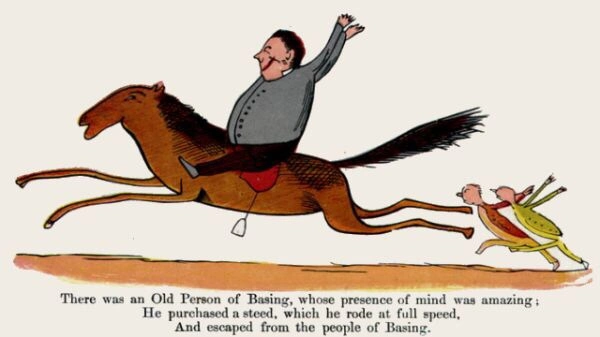I’ve loved Edward Lear’s nonsense writings and limericks ever since my parents bought me The Nonsense Books of Edward Lear when I was nine. His limericks are sometimes disparaged for his refusal to introduce a new rhyme in the last line: W S Gilbert satirised this in There was an Old Man of St Bees. But this criticism misses the point: he is not aiming for wit, we are in the realm of nonsense. The repeated rhyme at the end underlines the pointlessness of the story – no progress is made, and we end up where we started.
I love them all, of course, but here are 25 of my favourites – in no particular order.
***************

This was the first piece of Lear which won me over: I giggled at the absurd drawing (had this happened instantly, without warning?) and at the detailed listing of birds. Lear, of course, had started his career as an illustrator of animals and birds, and many of these early drawings seem to give the creatures strong, almost human personalities .
***************

I love this fellow’s indignation. “Certainly not!” His interrogator, and we, should not have to ask the question, when he is so obviously a Moppsikon Floppsikon Bear. He does gallop, evidently.
***************

***************

Many Lear limericks involve a malign “they” who frown on eccentricity, and sometimes brutally punish it. This illustration shows the happier part of the story. It is natural to see Lear as the true protagonist here: the harmless eccentric who regarded himself as an outsider – despite his many close friendships.
***************

***************

***************

I recognise a kindred spirit in the Old Person in the rhyme, with his carefully calibrated violence against fellow Minety dwellers – rocks, for example, would overstate the case, while tomatoes (or small apples) would barely get the job done. Of course, we’re left in the dark as to his motives, but he seems to be enjoying himself.
***************

***************

It’s that “they” again, this time acquainting the protagonist with an unwelcome fact rather than being outright malicious. Although they do seem to be enjoying his discomfort. Importantly the picture clarifies that although he is unhappy, he is not in immediate danger of drowning.
***************

***************

Again, the humour springs from our uncertainty. Does the fellow have any reason to think someone will answer, or is he randomly ringing a bell in the middle of nowhere? Lockdown Lear hero John, in his world-beating re-enactment, has pointed out the discrepancy between the text and the illustration: the Old Man’s hair doesn’t appear to be white at all. Very careless, Mr Lear, you’ve made Nonsense of it. Note that the last line here repeats the word from the second line for its rhyme, not the first, very adventurous.
***************

***************

D’you know, I’m not even sure there is a place called West Dumpet. Why, it’s almost as if Lear made it up, just because it rhymes with trumpet. This is unusual, most of his limerick locations are real places – as the Edward Lear trail has proved – many of which, the records confirm, Lear actually visited.
***************

***************

Here’s “they” again. Perhaps they started knocking him about with evil intent, but seem quite happy to continue now he appears to be enjoying it. Is this a cheeky dive into niche erotic tastes? Biographers have concluded that Lear was a closet – probably celibate – homosexual. And in the nineteenth century it was generally wise to stay in the closet, Oscar.
***************

***************

So is that “Hush!” to rhyme with push or “bush” to rhyme with rush? Often misquoted as “small bird in this bush” which of course makes Nonsense of the final line. Notable for the rare comic payoff. And “perceive”.
***************

***************

***************

***************

***************

***************

***************

***************

Once more, Lear leaves questions open. Was he escaping from aggression, persecution or boredom? What was his – or Lear’s – problem with Basing? But he’s so happy! He will need much presence of mind: he hasn’t bothered with any reins, nor made use of the stirrups.
***************
(This piece also appears in the Edward Lear Trail)

Leave a comment